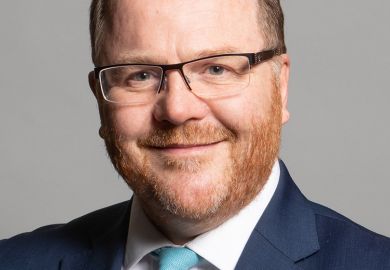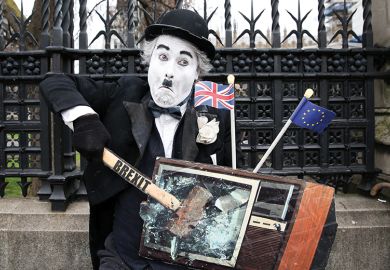The UK’s science minister was told the day before a crunch visit to Brussels that he would be unable to meet a top European Union representative to make the case for continuing association to Horizon Europe, according to an official.
George Freeman had said the UK was “still committed” to joining the €95.5 billion (£81.6 billion) research programme and had billed his 8 June Eurostar dash as “a last round of talks to highlight that time is running out”.
But Times Higher Education understands that a month-old request for Mr Freeman to meet with leading European Commission officials was declined the day before the trip, leaving him to deliver his arguments to an audience at the UK ambassador’s residence.
The office of research commissioner Mariya Gabriel had declined the request to meet back in mid-May, but executive vice-president Margrethe Vestager, who oversees competition issues, left it until the last minute to turn it down, according to a UK official.
“It is a real shame that they were unable to find anybody in their cabinet or in other commissioner’s cabinets to meet with him and that they didn’t make an effort,” the official said.
A commission spokesperson said that when dealing with meeting requests EU officials “decide on a case-by-case basis if the meeting is appropriate and of EU interest and fits into their schedule”.
Mr Freeman has maintained that the UK government wants to join Horizon, including after Ms Gabriel confirmed that this would be impossible until UK-EU disputes over the Brexit deal’s Northern Ireland protocol were resolved.
But he said on 7 June that the government was “ready to launch” a new £15 billion global research programme using the funding set aside for the UK’s contribution to Horizon.
In a series of tweets, he warned that “time was running out” following the bloc’s “continued blocking of the UK from Europe’s flagship research programmes that we have negotiated”.
“Nobody can turn around and say they weren’t warned and they didn’t see this coming,” the UK official told THE.
As the trip was under way, Scottish higher education minister Jamie Hepburn wrote to Mr Freeman to warn that he was “deeply concerned” that the Westminster government’s approach to the Northern Ireland protocol was “adding to the damage Brexit is causing to Scottish universities and the research community”.
Mr Hepburn said that Horizon Europe was “globally unparalleled” and that Scottish universities had “benefited greatly” from its “scope, scale and prestige”.
Martin Smith, head of the Wellcome Trust’s Policy Lab, called on the UK and the EU to “put aside their political differences and support scientists to find bold solutions to global challenges”.
“Horizon Europe is the largest multilateral research and innovation funding programme in the world. It is not just about Europe. Countries such as Japan, Canada and South Korea are all in talks to join. Its scale, connections and breadth of funding could not be replicated by any national scheme,” Mr Smith said.
“While the EU has indicated that UK participation is tied to negotiations over post-Brexit arrangements for Northern Ireland, the science should be viewed entirely separately to the politics.
“There needs to be an urgent resolution to allow the UK and the EU to continue working together through the programme in the years to come. With each day of delay, vital research collaborations are put on hold. Time is running out to find a solution and help guarantee world-leading British and European science.”
Register to continue
Why register?
- Registration is free and only takes a moment
- Once registered, you can read 3 articles a month
- Sign up for our newsletter
Subscribe
Or subscribe for unlimited access to:
- Unlimited access to news, views, insights & reviews
- Digital editions
- Digital access to THE’s university and college rankings analysis
Already registered or a current subscriber?








